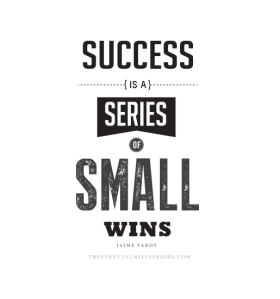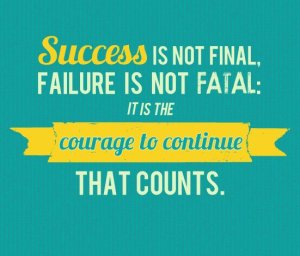 In my blog post last week I talked about how failure makes you a stronger person, but this week I want to focus on success. Success can mean a number of different things depending on the individual, and your definition of success also changes as you continue your career.
In my blog post last week I talked about how failure makes you a stronger person, but this week I want to focus on success. Success can mean a number of different things depending on the individual, and your definition of success also changes as you continue your career.
For example, it was announced last week that my company, The Wish Group, made it on the PROFIT 500 list of Canada’s Fastest Growing companies – number 364 respectively. Of course I’m extremely proud of my team for getting us this far, especially since this is the third year in a row that we’ve received this award.
This is considered a success, but this wasn’t the end game for me. My end game is becoming one of Canada’s premier providers of business solutions – a goal that’s radically changed since I first started my own business. Back then, I was simply focused on becoming a world-class leader of teleconferencing solutions. Thanks to multiple meetings with different entrepreneurs and spurring ideas back and forth with different people, my goals have now changed.
From chatting with these various entrepreneurs throughout my career and watching my own goals change, I’ve found that people define success in two different areas:
Money Made – This one is the most common definition, for better or worse. I’d say that the majority of people and not just entrepreneurs define their success by how much money they make. While money is important, becoming wealthy shouldn’t be your only goal. The most successful entrepreneurs I’ve met are the ones that see the wealth they’ve accumulated as a means to further their business, be it by funding new ideas or improving their current ones.
Difference in People’s Lives – This point is a big one for me. I personally want to help as many people as I can find their true calling in life, be it an entrepreneurial endeavour or otherwise. This means that I create as many jobs as I can, and mentor people to watch them grow and become successful on their own. While this may not always work with everyone who walks through my door, I at least hope that I touch their life far beyond just a paycheck.
How you define success isn’t important, what matters is how you reach that success. Let the accolades and positive feedback that you receive along the way motivate you towards your goal of success, and then push yourself one step further.

 There’s a big misconception when it comes to failure. Ever since we’ve been children, we’ve seen that failing is nothing but a negative experience. Teachers would be disappointed and parents would yell at you for failing a test. If you failed a course, you’d use up your valuable summer time taking make-up courses. There has always been negativity associated with failure.
There’s a big misconception when it comes to failure. Ever since we’ve been children, we’ve seen that failing is nothing but a negative experience. Teachers would be disappointed and parents would yell at you for failing a test. If you failed a course, you’d use up your valuable summer time taking make-up courses. There has always been negativity associated with failure. Many Canadians had faith in the Canadiens this year, as they were the only home-based team that made it to the playoffs. It’s no secret that I’m an avid fan of the Habs, so of course I found their loss this year particularly heartbreaking, given all that they had been through to make it that far. The team obviously knows where their weak points are and what they need to improve for next year. With the Habs learning lessons from their tough games, I also picked up on a few business related lessons while watching them play game six:
Many Canadians had faith in the Canadiens this year, as they were the only home-based team that made it to the playoffs. It’s no secret that I’m an avid fan of the Habs, so of course I found their loss this year particularly heartbreaking, given all that they had been through to make it that far. The team obviously knows where their weak points are and what they need to improve for next year. With the Habs learning lessons from their tough games, I also picked up on a few business related lessons while watching them play game six: If you decide to leave your job and open your own business, there are a few things you assume you’ll leave behind as well. Job security, consistency and a personal life are what some people think they’ll leave behind – and sometimes this is true. The problem here is that when people really start to think about these things, they get worried, and that worrying more often than not leads to fear.
If you decide to leave your job and open your own business, there are a few things you assume you’ll leave behind as well. Job security, consistency and a personal life are what some people think they’ll leave behind – and sometimes this is true. The problem here is that when people really start to think about these things, they get worried, and that worrying more often than not leads to fear.